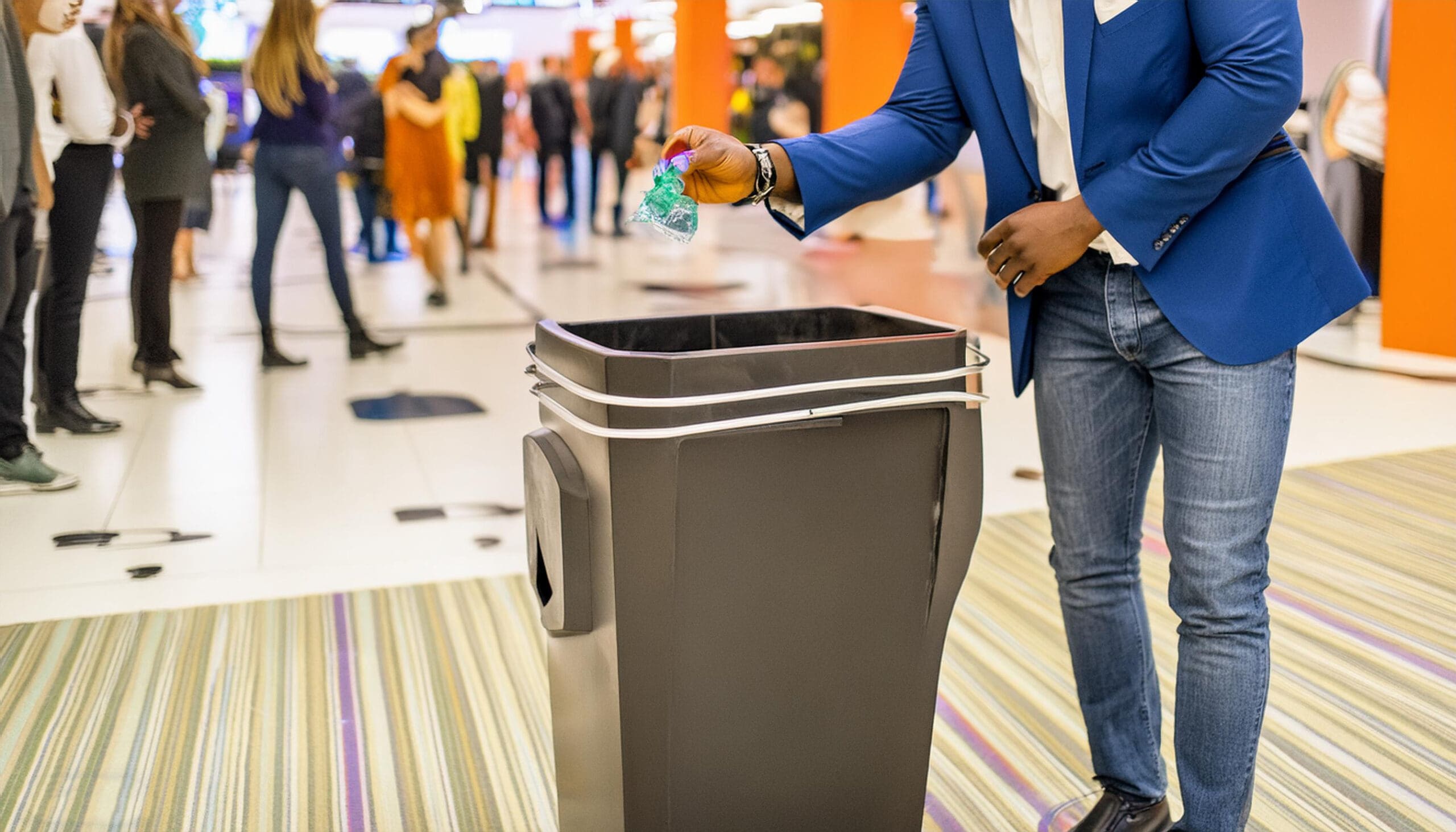The world is waking up to the urgency of sustainability, and the event industry is no exception. Today’s savvy event planners understand that minimizing environmental impact isn’t just a fad, it’s a responsibility. But beyond doing your part for the planet, embracing sustainable practices is a smart business move, preparing your company for a future where eco-consciousness reigns supreme.
Imagine hosting an event that not only leaves a lasting positive impression on your guests but also showcases your brand’s commitment to environmental responsibility. Think captivating design, meaningful experiences, and themes that resonate with a global audience – all woven together with sustainable practices at the core. That’s the magic of sustainable event planning, and it’s more achievable than you might think.
Beyond Buzzwords, Real Impact
Sustainable event planning isn’t just about trendy hashtags; it’s about aligning your events with the objectives of the modern industry and the broader aspirations of our world. By prioritizing impactful experiences, responsible sourcing, and eco-conscious practices, you’re directly contributing to the United Nations Sustainable Development Goals (UN SDGs). Reducing carbon footprint, conserving resources, supporting local communities, and raising awareness about climate change – these are the real-world outcomes you can achieve through sustainable event planning.
Technology as Your Sustainable Ally
Even the tools you use can make a difference. Event management software like SyncEvent empowers you to ditch paper invitations and brochures, eliminating unnecessary waste and contributing to a greener future. Think about the impact – one event at a time, the paper trail shrinks, and the positive environmental impact grows.
Join the Green Wave
Ready to dive into the world of sustainable event planning? We’re here to guide you every step of the way. In this blog, we’ll unveil essential best practices and top tips for hosting environmentally friendly and socially responsible events. From reducing your carbon footprint to sourcing responsible suppliers and promoting eco-conscious behavior among attendees, we’ll equip you with the knowledge and tools to make a difference.
Remember, sustainability isn’t a destination; it’s a journey. Let’s embark on this journey together, shaping a greener future for the event industry, one event at a time. Are you ready to join the wave of change? Stay tuned for actionable strategies and practical tips you can implement right away!
The Green Foundation: Setting Your Environmental Goals and Building a Sustainable Blueprint
Every sustainable journey starts with a clear destination. In the realm of event planning, that destination takes the form of environmental goals. These goals serve as your North Star, guiding your decision-making and ensuring your event leaves a positive impact on the planet.
1. Unveiling Your Environmental Footprint: Take Stock and Evaluate
Before charting your course, it’s crucial to understand your current standing. Conduct a thorough environmental audit of your event planning practices. Consider the following aspects:
- Energy consumption: How much energy is used during your events, from venue operations to transportation and catering?
- Resource usage: How much paper, water, and other resources are consumed throughout the event lifecycle?
- Waste generation: How much waste is produced, and what strategies are in place for waste reduction, recycling, and composting?
- Travel and transportation: What is the carbon footprint associated with attendee travel and transportation logistics?
- Materials and sourcing: What kinds of materials are used for decorations, signage, and giveaways? Are they sustainable or potentially harmful?
By meticulously evaluating these areas, you’ll gain valuable insights into your event’s environmental footprint. This knowledge empowers you to identify key areas for improvement and prioritize your sustainability efforts.
2. Setting SMART Goals: Measurable, Achievable, Relevant, and Time-bound
Now that you know your starting point, it’s time to define your destination. Establish SMART environmental goals that are:
- Specific: Clearly define what you want to achieve, like reducing energy consumption by 20% or diverting 75% of waste from landfills.
- Measurable: Quantify your goals so you can track progress and assess success. Set targets for resource reduction, waste diversion, or carbon footprint mitigation.
- Attainable: Be realistic and choose goals that are achievable within your budget, resources, and timeline. Celebrate small wins along the way!
- Relevant: Ensure your goals align with your overall event objectives and brand values. Are you aiming for carbon neutrality, supporting local communities, or raising awareness about a specific environmental cause?
- Time-bound: Set deadlines for achieving your goals to maintain momentum and accountability. Break down larger goals into smaller, actionable steps with achievable milestones.
Remember, your goals should be ambitious yet achievable. Start small and gradually increase your sustainability efforts over time.
3. Embedding Sustainability in Your Team’s DNA: Building a Culture of Green
Once you’ve established your goals, it’s crucial to get everyone on board. Educate your team members about the importance of sustainable event planning and their role in achieving your goals. Provide them with the resources and training they need to make sustainable choices throughout the planning process.
- Develop a sustainability policy: Create a clear and concise document outlining your commitment to sustainability and the specific practices you will implement.
- Offer sustainability training: Educate your team on best practices for eco-friendly decision-making, from sourcing materials to managing waste.
- Empower green champions: Identify team members who are passionate about sustainability and encourage them to lead initiatives and inspire others.
- Communicate progress and celebrate successes: Regularly share updates on your sustainability efforts and achievements with your team to maintain momentum and foster a culture of environmental responsibility.
By setting clear goals, building a culture of green within your team, and leveraging tools like SyncEvent’s eco-friendly features, you can lay a solid foundation for your sustainable event planning journey. With each event you organize, you’ll leave a lighter footprint on the planet and pave the way for a greener future for the event industry.
Conquering the Waste Monster: Minimizing Waste and Embracing Circularity
Waste not, want not! Waste management might seem like a logistical hurdle, but it’s a crucial aspect of sustainable event planning. Remember, it’s not just about throwing things away; it’s about creating a circular economy where resources are valued and reused at every stage. Let’s explore how to minimize waste generation and embrace responsible recycling practices:
1. Ditch the Disposables, Embrace the Reusables:
Every single-use item adds up to a significant environmental impact. Here’s how to swap disposables for reusables:
- Utensils, Tableware, Servingware: Replace plastic forks, plates, and cups with durable, reusable alternatives made from materials like bamboo, stainless steel, or recycled plastic. Opt for washable tablecloths and napkins over disposable options.
- Beverage Service: Ditch the bottled water – it’s wasteful and often unnecessary. Instead, offer filtered water in pitchers or dispensers with reusable cups. Encourage attendees to bring their own reusable bottles and promote refill stations to minimize single-use plastic.
- Decorations and Signage: Get creative with reusable decorations made from natural materials like wood, fabric, or recycled items. Explore digital signage solutions or reusable banners to minimize printed materials.
2. Recycling Champions: Making it Easy and Effective:
Recycling isn’t magic; it requires clear communication and infrastructure. Here’s how to empower your attendees to recycle effectively:
- Strategic Bin Placement: Place clearly labeled recycling bins throughout the venue, ensuring they’re accessible and easy to identify. Consider color-coding for different materials like paper, plastic, and glass.
- Educate and Inform: Provide signage and educational materials that clearly explain what can be recycled and how to sort waste properly. Leverage event apps or digital signage to share recycling guidelines and raise awareness.
- Partner with Responsible Vendors: Choose vendors who share your commitment to sustainability and offer packaging materials that can be easily recycled or composted.
3. Technology to the Rescue: Reducing Paper, Maximizing Impact:
Event apps and digital platforms like SyncEvent are your allies in waste reduction. Here’s how they can help:
- Ditch the Paper Trail: Eliminate printed invitations, brochures, and programs by utilizing digital invites, mobile ticketing, and online event agendas accessible through the app.
- Real-time Updates: Share event updates, schedules, and announcements through the app instead of paper handouts, reducing printing needs and ensuring everyone has access to the latest information.
- Networking Made Easy: Facilitate attendee networking within the app through messaging features, forums, or virtual meeting rooms, eliminating the need for printed name tags or networking guides.
Remember, waste management is a collaborative effort. By choosing reusable options, implementing clear recycling strategies, and leveraging technology, you can significantly reduce your event’s environmental footprint and foster a culture of responsible resource consumption. Let’s work together to turn waste into opportunity and create events that leave a positive impact, not a landfill of trash.
Choosing Wisely: Eco-Conscious Venues and Accommodations for a Sustainable Event
The foundation of a truly sustainable event lies in the venue you choose. It’s not just about aesthetics; it’s about selecting a space that reflects your commitment to environmental responsibility. Let’s explore how to make eco-conscious choices when it comes to venues and accommodations:
1. Unveiling the Green Gems: Venues with Sustainability Cred
Not all venues are created equal! Seek out venues that prioritize sustainability and hold certifications like LEED (Leadership in Energy and Environmental Design) or Green Globe. These certifications verify their commitment to eco-friendly practices such as:
- Energy Efficiency: Look for venues with energy-efficient lighting, HVAC systems, and appliances. Bonus points if they utilize renewable energy sources like solar panels!
- Waste Management: Opt for venues with responsible waste management programs that prioritize recycling, composting, and minimizing landfill waste.
- Water Conservation: Choose venues with water-saving fixtures and practices, such as low-flow toilets and rainwater harvesting systems.
- Food Sourcing: Support venues that source local and organic food whenever possible, reducing the environmental impact of transportation and supporting sustainable agricultural practices.
Remember, don’t be afraid to ask questions! Explore the venue’s sustainability initiatives and inquire about their specific measures to minimize their environmental footprint.
2. Location, Location, Location (and Transportation!):
It’s not just about the venue itself; consider its accessibility too. Choose a venue easily reachable by public transportation, biking paths, or walking routes. This will encourage attendees to opt for greener travel options and minimize carbon emissions associated with private vehicles.
3. Where Guests Rest Their Heads: Sustainable Accommodations
Extend your eco-consciousness to your guest accommodations. Encourage attendees to stay in hotels or lodgings with green certifications or environmental initiatives. Look for hotels that:
- Offer energy-efficient rooms and appliances.
- Implement water conservation practices.
- Utilize eco-friendly cleaning products.
- Support local communities and businesses.
You can even set hotel accommodation standards for guests and staff, gently nudging them towards more sustainable choices.
4. Reimagining the Event: Virtual and Hybrid Options
Consider the environmental impact of attendee travel. Explore the possibilities of hosting a hybrid or virtual event, allowing remote participation. This can significantly reduce carbon emissions associated with travel, making your event accessible to a wider audience while minimizing your environmental footprint.
By prioritizing eco-friendly venues, encouraging sustainable travel options, and exploring virtual or hybrid formats, you can create events that are not only memorable but also environmentally responsible. Remember, every small step towards sustainability contributes to a greener future for the event industry and our planet. Let’s choose wisely and pave the way for a more sustainable event experience for everyone involved.
Savor Sustainability: Delicious Food Choices with a Lighter Footprint
Food is more than just fuel; it’s an experience, a cultural touchstone, and a powerful way to connect with your guests. But let’s not forget the environmental impact of what we serve at events. By prioritizing local, sustainable, and responsible catering choices, you can create mouthwatering experiences while nurturing our planet. Let’s delve into the delicious world of eco-friendly catering:
1. Sourcing with a Conscience: Local, Seasonal, Fair Trade
Think fresh, think local! Partner with catering services committed to sourcing ingredients from local farms and producers. This reduces the carbon footprint associated with long-distance transportation and supports sustainable agricultural practices in your community.
- Seasonal Symphony: Embrace the bounty of each season! Opt for menus featuring locally sourced, seasonal produce at its peak freshness and flavor. You’ll not only support local farmers but also ensure the highest quality and taste for your guests.
- Fair Trade Focus: Extend your ethical considerations to international ingredients. Choose caterers who prioritize fair trade practices, ensuring fair wages and sustainable farming methods for producers worldwide.
Remember, every ingredient tells a story. By choosing local and ethically sourced options, you create a more meaningful and impactful culinary experience.
2. Plant-Based Power: Delicious & Sustainable
Did you know that animal agriculture has a significant environmental impact? Plant-based meals often have a smaller carbon footprint compared to meat and dairy options. Consider incorporating vegetarian and vegan dishes into your menu:
- Culinary Creativity: Partner with a caterer who can craft delicious and diverse plant-based dishes that tantalize taste buds and leave your guests wanting more. Think beyond salads and explore the exciting world of plant-based proteins, grains, and creative flavor combinations.
- Catering to All Diets: Offer a variety of options to cater to dietary restrictions and preferences. Ensure your menu includes vegetarian, vegan, and gluten-free choices, making your event truly inclusive and enjoyable for everyone.
Going plant-based doesn’t have to mean sacrificing flavor or excitement. Embrace the culinary potential of plant-based cuisine and offer your guests a delicious and sustainable dining experience.
3. Minimizing Waste: From Planning to Plates
Food waste is a major environmental concern in the event industry. Implement smart strategies to minimize waste and maximize resource utilization:
- Portion Control Precision: Partner with your caterer to accurately estimate guest numbers and plan portion sizes accordingly. This prevents overpreparation and reduces food waste. Offer smaller serving options with the possibility of seconds instead of large, potentially uneaten portions.
- Leftovers with a Purpose: Don’t let leftovers languish! Partner with food rescue organizations that collect and distribute surplus food to those in need. Not only are you minimizing waste, but you’re also contributing to your community’s well-being.
- Composting Creativity: Consider composting food scraps and biodegradable materials from your event. This transforms waste into nutrient-rich soil, benefiting gardens and agricultural sustainability.
By implementing these strategies, you can significantly reduce your event’s food waste footprint and ensure that your delicious offerings contribute to a healthier planet.
Remember, sustainable catering is a journey, not a destination. By partnering with responsible vendors, making informed choices, and minimizing waste, you can create a culinary experience that’s not only delicious but also kind to our planet. Let’s savor the flavors of sustainability, one mindful bite at a time!
Leaving a Lasting Green Legacy: Embracing Sustainability with SyncEvent
As the event industry blossoms, its environmental impact must shrink. By weaving sustainable practices into your events, you’ll not only leave a positive footprint but also set a powerful example for the industry. Remember, this green journey starts with educating your team, partnering with eco-conscious vendors, and making responsible choices at every turn.
Here’s the real beauty: you don’t have to navigate this path alone. SyncEvent’s robust event management software empowers you to implement all the strategies discussed in this article – and more. From sourcing local vendors to minimizing waste, managing energy consumption, and even promoting event sustainability to attendees, SyncEvent equips you with the tools and resources to make every event truly green.
Imagine crafting sustainable events that resonate with your audience, leave a lasting positive impact, and elevate your brand image as a sustainability leader. With SyncEvent by your side, this vision becomes a reality.
Ready to embark on your sustainable event planning journey? Schedule a free 15-minute demo of SyncEvent today and discover how our software can transform your event management process into a force for good. Let’s work together to create a greener future, one event at a time!













